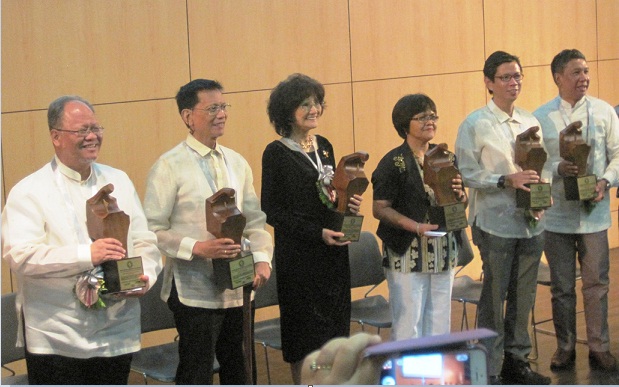Text and photos by ELIZABETH LOLARGA
THE end of Buwan ng Wika in August marked the beginning of a writer’s exercise in examining one’s heart before writing. This is among the challenges given by this year’s Gawad Pambansang Alagad Balagtas awardees.
Karina Bolasco, chair of the Unyon ng mga Manunulat sa Pilipinas (UMPIL) that hands out the yearly prizes recognizing individuals and groups for lifetime achievements in various Philippine literatures, said, “New technologies… are altering the rules of the game, and the very nature of being a writer. It is no longer a culture of individual reflection or a personal singular identity; it is unthinkable today to sit around and think only of one’s self in this world…Anyone is a citizen journalist or commentator, instant or spontaneous writer, a documentarist, videographer, or filmmaker.”
She described how technology has leveled the playing field and democratized opportunity, allowing people “to be immediately involved and to participate publicly. It is a world of collective identity which day to day we help shape; and story-telling is a form of collective writing.”
Receiving for the Baguio Writers Group the Gawad Pedro Bucaneg, BWG president Frank Cimatu said his organization has “made literature fun” with workshops not just for aspiring writers but for those in midlife and retirement, poetry slams or spoken word events, all aimed at sparking enthusiasm in writers and readers in Baguio.
UMPIL recognizes outstanding literature teachers with the Gawad Paz Marquez Benitez. Awardee Lina Diaz de Rivera continues to spread a passion for reading and learning among students and teachers. She said, “The best way to learn is to teach. It has been a privilege and delight to teach literature for its two greatest gifts to its readers: wisdom and wonder, brought by wielding words that create magic that is real, true and everlasting.”
Rolando Tolentino, recognized for “narratives edged with social commentary that advance gender and class consciousness,” spoke of the difficulty in finding the right words to reach an audience apart from balancing the needs to write for a living and to enrich one’s life so one can have something to write about.
At the same time he considered himself fortunate for being adopted by UP, enabling him to write with the people’s interests in mind. He added that an award doesn’t end his journey because writers still have to face burning social issues like the pork barrel system of lords made felt by Janet Napoles, human rights violations committed by the likes of fugitive Maj. Gen. Jovito Palparan, the anguish of the mothers of desparecidos. He called these issues “the curse and challenge I chose to carry in the past 30 years and the subsequent 300 years.”
Floy Quintos, whose plays “attempt to understand and reveal the most important and perplexing interior of the Filipino in the historical as well as contemporary contexts,” said his works owe their success to the actors who gave them life and the many anonymous people backstage. He offered his award to them.
Sending his message from Hawaii, fictionist-poet Francisco Ponce hoped that the Philippines grow its respect for the diverse languages written and spoken in the country in the same way that Hawaiian courts provide interpreters or voting machines also in his mother tongue, Iluko.
Mario Miclat, fictionist and essayist who spent 15 years of exile with his family in China during the Marcos regime, expounded on the Ben Johnson adage about examining the heart before writing. He said a writer must detest the anomalies exemplified by the Napoles scam, stay away from work that manipulates the public’s trust, refuse to get mired in naiveté and stupidity, sort out the mystery of national ignorance and right it towards the platonic ideal of the true, the good and the beautiful.
Grace Hsieh-Hsing Lee was recognized for poetry that “traverses and intersects two cultures (Filipino and Chinese) and brings together Philippine history and contemporary reality.” Her poem “Kalye Ongpin,” reflected how well-integrated the poet is, ending with: “Tuwing naiisip ko ang Tsina/ Sa Ongpin nagpupunta,/ Nasa Chinatown ang Kalye Ongpin./ Ang Chinatown ay hindi nasa Tsina/ Ang Chinatown ay hindi Tsina.”
Alice Tan Gonzales, awardee for works in Hiligaynon, said, “Though we come from different parts of the country…our writings move toward the same objective: the expression of what is human and what is Filipino. Love in any other Philippine language—whether pag-ibig or gugma—means the same thing, bringing on the same painfully beautiful feelings, and nation—whether written as bayan or pungsod—conjures the same Filipino community with its accompanying feelings and aspirations.”
Calasanz, who poetry in Filipino “provides the setting for passionate introspection into the complexities of the self,” closed the afternoon with an advice couched in verse: “Ibulsa ang kalungkutan/ Halikan ang hangin.”
